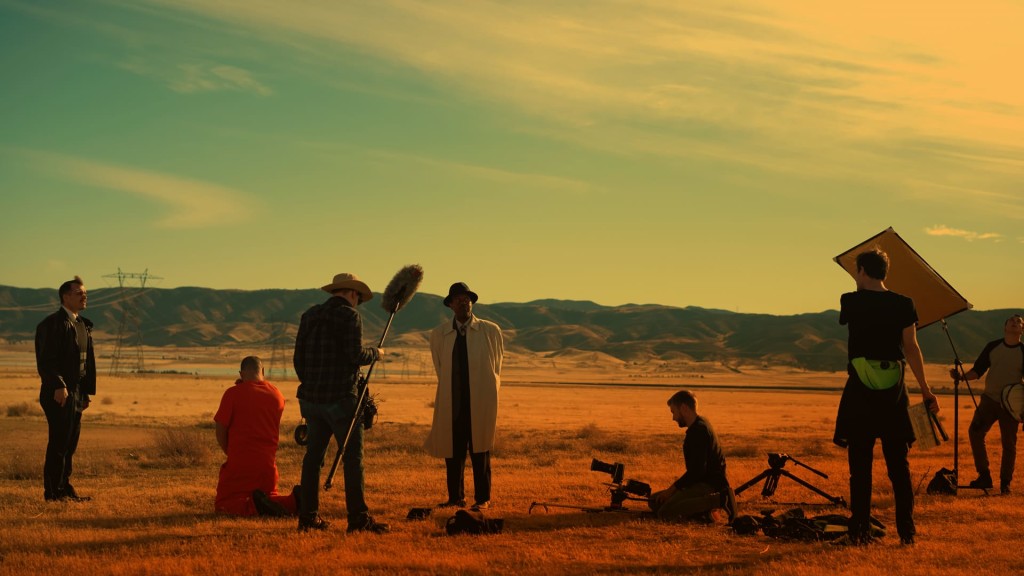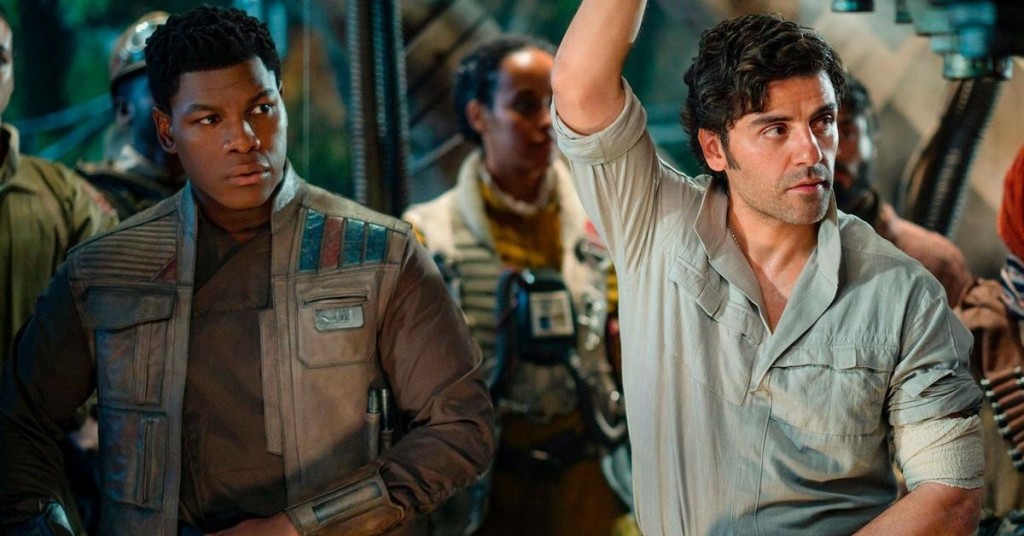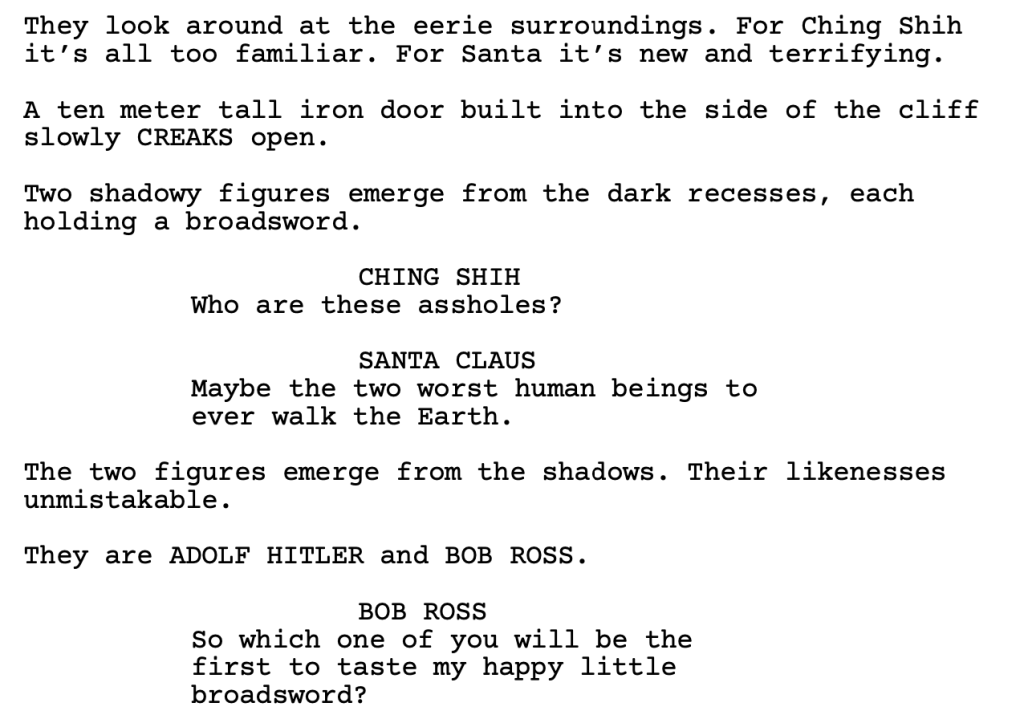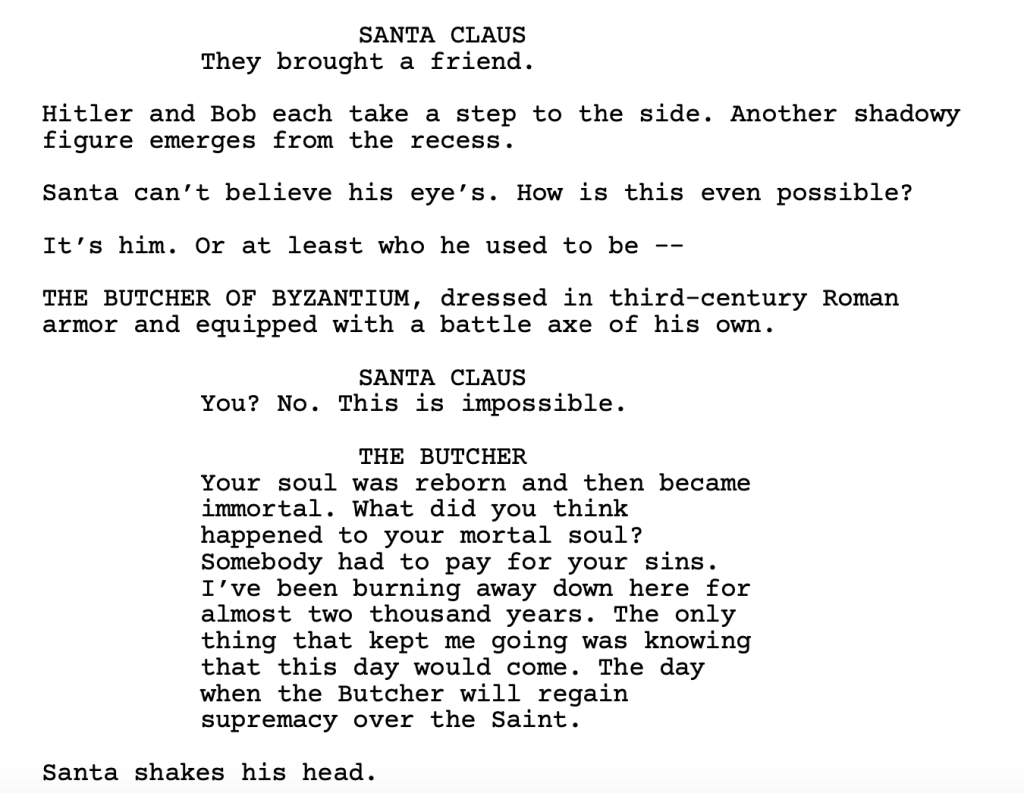Welcome! Come one, come all, to this exciting Monday. You read the headline so there are no secrets here. 2020 is going to be a transition year for Scriptshadow. Over the next eight months, I am going to be moving away from the site and into production. I know that’s a giant anvil of WTF. You probably have a lot of questions. So I’ll try and answer them for you. Let’s get into it. Shall we?
I’ve wanted to make movies ever since I moved to Los Angeles. At one point it was as a writer. At another point it was as a director. But as the years have passed, and especially after the experiences I’ve had with Scriptshadow, I believe I’m best suited to make movies as a producer. That means finding the script, working with the writer, putting the elements together, and making the movie, baby!
I know producing movies is challenging but I have a secret weapon. You guys. While I’ve been running this site for the past ten years, I’ve been carefully taking note of every strong script I’ve read, every strong concept I’ve come across, every strong writer, every writer with potential – all with this moment in mind. I knew, at some point, I was going to make this jump, and I’ve got a long list of writers I discovered right here, that are going to make Scriptshadow Productions a force to be reckoned with.
I would go so far as to say I know more good unknown writers than anyone in the world. These writers only need an opportunity, someone who believes in them and wants to work with them, and I want to be that first person for them. Furthermore, one of the legacies I want to leave in this business is to have brought tons of new writing talent from all over the world into the business and for those writers to have long fruitful careers.
When it comes to my producing strategy, I’m looking for the kind of material I tell you guys to write all the time. I’m partial to high concept ideas that are financially manageable. I want to make movies that are exciting and fun. Horror, science-fiction, thrillers, action. For reference, here is a list of the TYPES of movies I want to make…
Get Out
It Follows
Psycho
Parasite
Searching
Dead Calm
The Equalizer
A Quiet Place
Nightcrawler
Sex Lies and Videotape
Shut In
Cop Cam
Cloverfield Lane
District 9
Memento
Knives Out
Ex Machina.
I’m not interested in cerebral dramas or anything that’s trying to win an Oscar. I don’t want to be one of these producers who loses his house over The Goldfinch. My template is more Blumhouse and Bad Robot. I want to make crowd-pleasing movies that make money. With that said, I started this site as a celebration of screenwriting. And a lot of that spirit is still in me. So if you have something that doesn’t match these criteria but you believe it’s amazing, that’s fine too. I probably wouldn’t have encouraged Reggie Christmas to send me Jingle Hell Rock. But it turned out to be one of my favorite scripts of the year and now I want to find a way to make it. Just know the equation you’re dealing with when you submit unorthodox scripts. The more off-the-beaten path the script is, the better it has to be.
So how is this going to work? Don’t I need money to produce movies? A team? That’s what these next eight months are about. They’re about calling up these writers I’ve found and asking them what they’ve got. A bunch of good old fashioned pitch sessions. It’s about taking the scripts I’ve fallen in love with out to producers and financiers and studios. A big part of these next eight months is going to be finding a producing partner who complements me. So I’m going to be setting up a lot of meetings for that. These eight months are going to be about setting up the dominos so I can knock them down.
Oh, and there’s one other reason I need these eight months.
It’s to find one last great screenplay through Scriptshadow.
That’s right. It’s the final screenplay contest. And it’s going to be called, appropriately, The Last Great Screenwriting Contest. The best thing about this contest? It starts RIGHT NOW. And staying with Scriptshadow tradition, it’s 100% free. ANYONE can enter.
The only catch is, because I’m the only person reading the screenplays, I can only guarantee I’ll read the first 10 pages of your script. If your script doesn’t capture me in those 10 pages, I will stop reading and move on to the next one. That’s the only way I’m going to be able to get to every entry.
To enter, all you have to do is e-mail me at carsonreeves3@gmail.com with the subject line: THE LAST GREAT CONTEST. Include your title, genre, logline, and a PDF of the script. The deadline for entries will be Sunday, June 14th (EDIT: EXTENDED TO JULY 4TH!!!), 11:59pm Pacific Time. But you can start sending scripts now, which I recommend, since I’ll have more time to read them now, so I’ll be more focused. You can send as many scripts as you want. But if I read two of your scripts and the first ten pages are garbage, I’m not giving you the benefit of the doubt with your other entries. Typically, we all have one script that’s better than the rest. I would submit that. Maybe one more, as some writers like to submit their most commercial script and their most personal script.
I will announce the winning script on September 1st. And from there it’s about me and you trying to get that script produced. There are no guarantees. Which is why I’m not charging an entry fee. Also, this isn’t about a single winner. I’m looking for AS MANY WINNERS AS POSSIBLE. I want to find as many new writers as I can. I want to find as many great scripts as I can. And that’s really what this next 8 months is about. It’s about finding writers and scripts through whatever avenue I can. I don’t care if it’s through the contest, through Amateur Showdown, through a referral, through a script consultation. I just want to find great material. Whatever leads us to making a movie is all right by me.
Questions You May Have
Q: How will Scriptshadow operate over the next eight months?
A: It’s going to be business as usual for the first two months of the year. After that, I still plan to update regularly. However, I’ll start taking a few days off here and there for producing duties. Still, March and April should have a steady flow of up-to-date posts. As we move into May, that’s where a more severe focus will be placed on producing duties. However, I hope to update three times a week during that period.
Producing takes up a surprising amount of time. You’re constantly on phone calls and at meetings and reading scripts and giving notes and, especially when a project starts to move, it’s time-consuming. Since much of that time will be dictated by the projects, a lot of the details are still up in the air at this point. Which is why I don’t know exactly how much time I’ll have. Who knows, I might have more time than I thought. I’m also considering blogging about the producing process, which would allow me to post stuff without having to read a script or see a movie first.
Q: What happens to Scriptshadow after these eight months are over?
A: I don’t know yet. A number of people have told me I’d be crazy to desert Scriptshadow because it’s such a great platform to find writers. So I’m still trying to think of a way to keep it going in conjunction with producing. However, the few times I’ve tried to produce projects while running Scriptshadow, I’ve had to abandon them because the site demands too much time. I don’t want to put myself in that position again. I want to give 110% to producing as it’s not the type of job you can half-ass. I like the idea of a bi-monthly genre-targeted Amateur Showdown. So maybe six showdowns a year. I just don’t know if writers are going to hang around the site during the downtime. It’s something I’m trying to figure out.
Q: Can I submit Amateur Showdown or consultation scripts to The Last Great Screenplay Contest?
A: Yes. But if you’re asking that question, you’re missing the point. I just want to find great scripts. I don’t care if I find them on Amateur Showdown or in The Last Great Screenplay Contest. A great script is a great script regardless of where it’s discovered. So if I read the next Jingle Hell Rock in Amateur Showdown or through a consultation, I won’t tell you, “Make sure to enter the contest!” You’ll have already accomplished what the contest set out to do, which is to make me aware of you as a good writer and your script as a great script.
Q: What if I don’t want my script to be produced by you?
A: If you’re not interested in the grand prize, you probably shouldn’t submit a script, lol. I get it. There are no guarantees I’ll be able to get your script produced. However, there’s a very good chance that you’ll receive some ancillary benefits, such as getting a manager and, hopefully, an agent (if the writers and agents ever squash their beef) as well as meeting new contacts in the industry that may pay off for you in other ways. And, to make you feel a little better, if you decide, after winning, that you don’t want me to produce your script, you have every right to tell me thanks, but no thanks.
Q: I have so many questions about The Last Great Screenplay Contest, Carson!
A: This post is meant to announce the contest. I will put up a more detailed contest post next week. Feel free to ask any questions in the comments below and I will make sure that the official contest post addresses them.
Q: Are you producing TV shows or just features?
A: While my main focus is to produce movies, someone I admire once told me: “Making movies is a hobby. Making TV is a business.” So of course I plan to develop TV shows as well. But I just want to find great content, wherever it comes from. Media is changing faster than ever and I’m keeping that in mind as I transition into producing. If someone has a great movie idea, let’s go make it. But if someone has, say, a revolutionary podcast idea, I’m open to that as well. Youtube series? Bring it on. It doesn’t matter to me as long as it’s a killer story. I’m reminded of the novel JJ Abrams produced by Doug Dorst where there were notes written in the margins. That’s the kind of outside-the-box thinking I want to utilize as a producer.
Q: Hey Carson. I work in the industry and follow your blog. I would like to work with you on something, or at least chat.
A: Feel free to e-mail me (carsonreeves1@gmail.com)! I know a lot of industry people read the site in the shadows. Maybe it’s time we finally connect! Especially if you’ve found that our taste lines up, drop me an e-mail and we’ll meet up. One of my primary goals in this process is finding great collaborators to work with.
I know this is a jarring post for some of you, especially those who have been with Scriptshadow for the long haul. It’s going to suck not having the site around anymore, at least in the capacity that it is now. But this has always been in the plans for me and right now, at the start of a new decade, it feels like the right time to make this move. I need a new challenge and what’s more challenging than making movies? :) So as much as it pains me to leave something behind, I’m thrilled to replace it with something I’ve always dreamed about. And I’m even more thrilled to be taking some of you with me. So I don’t think I need to make this next directive any more clear: START WRITING THOSE SCREENPLAYS!!!
CHECK YOUR INBOXES!
Your SPAM folders and PROMOTIONS folders. The Scriptshadow Newsletter should be there.
This newsletter is awesome. I talk about the end – the END – of the Star Wars saga and where they go from here. I take on my five FAVORITE and my five LEAST FAVORITE movies of 2019. I give some personal shout-outs to the breakthrough Scriptshadow amateur screenwriters of the year. I give some thoughts on the latest trailers, including Christopher Nolan’s latest. And I review one of the top 3 biggest spec sale scripts of the year. Is it everything, all of that, and a big ball of lettuce wrapped into one? Only way to find out is to read the newsletter.
If you want to read my newsletter, you have to sign up. So if you’re not on the mailing list, e-mail me at carsonreeves1@gmail.com with the subject line, “NEWSLETTER!” and I’ll send it to you.
p.s. For those of you who keep signing up but don’t receive the newsletter, try sending me another e-mail address. E-mailing programs are notoriously quirky and there may be several reasons why your e-mail address/server is rejecting the newsletter. One of which is your server is bad and needs to be spanked.
Okay, so Scriptshadow is closing down for the holidays. I’ll be back on Monday January 6th with a GIGANTIC announcement. This is a big one. I’d even say world-changing. Also, I’m going to get a final 2019 Newsletter out. That should be coming this Friday. I’ll post here as soon as I send it out in case it slips into your Promotions folder. To give this post some sense of a theme, feel free to share your favorite movies of the year. I have two more I’m dying to see (1917 and Uncut Gems). Merry Christmas, Happy Holidays, and have a wonderful new year everyone!!!
Genre: Sci-Fi/Fantasy
Premise: Rey, Poe, and Finn must come together to find the evil Emperor and stop his “Final Order” plan to take over the galaxy.
About: It’s finally here! After many many months, the much talked about “final Star Wars film” has hit theaters. Already, there are mumblings of “failure.” The movie made 175 million this weekend, which is 25 million less than predictions. Last Jedi made 220 million its first weekend. Force Awakens made 247 million. It will likely be the nail in the coffin for Kennedy, who never really understood the franchise, resulting in numerous missteps. But none of that has anything to do with whether the movie is actually good. Is it? Let’s find out!
Writer: Chris Terrio/JJ Abrams (George Lucas)
Details: 2 and a half hours long
Duh duhhhhhhh duh duh duh DA da. Duh duh duh DA DA duhh duhh duhh duhhhhhh!
SPOILERS DROID: “BEE-BEEEP BOOOOP SPOILERS BELOW, I HAVE SPOKEN”
I’m hopped up on Sudafed, Advil, and Vitamin C so WATCH OUT! You’re about to get a review for the ages.
I’m going to get right into it.
I LOVED THIS MOVIE. Absolutely positively loved every second of it. There is literally nothing I disliked.
And let me take a quick detour because there’s something going on on the internet that’s infuriating me. Tons of Youtubers realized that they got 10x as many views as they’d ever had on any video when they trashed The Last Jedi. It’s not hard to figure out how those same people are going to approach their reviews for this movie. “Money or truth? I’m going with money, buster!” This is why you see so many Star Wars reviews on Youtube that say, “WORST MOVIE EVER!” and “A CATASTROPHE!”
I have no issues with people who disliked this movie. But if you’re going to try and convince me it’s the worst movie ever or “a catastrophe,” I’m going to tell you you’re a straight up liar. This movie was one of the most entertaining movies ever made. And there’s no way you didn’t have at least a little bit of fun watching it.
My viewing experience started off confusing because I’d heard all these reviews saying that the first 45 minutes were awful and confusing. The first 45 minutes were great (LIGHT SPEED SKIPPING!) I kept waiting for them to get bad and waiting for them to get bad and they never did. A lot of people were confused by the multiple McGuffins, Sith planet finders and daggers – but all of that made perfect sense to me. It’s a hidden planet so they’re going to have to go on a galaxy-wide hunt to find it. Duh.
From there, it only got better. And it started with Rey and Kylo. I was lukewarm on Rey in Force Awakens. I straight up despised her in Last Jedi. But here, she’s awesome. There’s so much conflict within her in every frame. She really earned the title of strongest Jedi in the galaxy through this movie.
And Kylo, who’s always been a great character, was at his best here. I loved how JJ and Terrio advanced the “Force Skype” power so that objects could travel between them. I thought that was well set up and it was also well paid off. And I loved the chemistry between the two. I’ve been a little weirded out over the Reylo fan fiction stuff online but by the end of this movie, I was rooting for it. And I was one of the people clapping when they kissed.
Now when it comes to “the group” (Rey, Finn, and Poe) and how a lot of people turned on Rian Johnson for splitting them up, I was never in that camp. In the second movie, you have to split everybody up so that the audience wants to see them back together again. Could Johnson have done it like Empire and had them together at the start and also at the end? Sure. But then you risk looking like you copied Empire. So that didn’t bother me. What bothered me was that Finn’s mission was dumb and Poe’s was lame.
However, now that I see how much chemistry these three actors have with each other, I agree with everyone else. You needed to put these three together in as much of the trilogy as possible. They’re the reason this movie was so fun. Their dialogue was funny. Their action scenes were great. They’re people you want to be around ,you want to be friends with. I think writers forget that simple tip. Give us characters we’d want to be friends with in movies like this.
Yet another accomplishment is that I’ve never seen a movie this long that plays this fast. We are SCREAAAAMING through this plot. Someone said online that the movie takes place over 16 hours of time? That was another strong choice by JJ. He knew he was in a desperate situation coming off the plot mess that was Last Jedi. So he went back to one of oldest screenwriting tricks in the book – KEEP IT MOVING. Make sure characters always want something whenever we come into a scene with them. Make sure they want that something NOW. Not at some later date. If you’re cutting between 3-4 storylines with that kind of pace, your movie is going to move.
A lot of people are upset about the fan service. Not me. I loved every single fan service moment. I liked Harrison Ford showing up. No idea that would happen! I liked the callback of Kylo saying he needed to do something but didn’t know if he could do it then throwing his lightsaber away (he needed a new one anyway – that one was too cumbersome), I LOVED Luke catching Rey’s lightsaber and telling her to hold onto it. The highest profile “FU” from one director to another we’ll ever see. I loved that Luke was happy again! That we finished Luke’s character on a happy note. I loved that he levitated the X-Wing like Yoda did. Awesome.
And I loved the new stuff too!
BABU FRIK!!!
My biggest laugh in the theaters this year was C-3P0 saying, “Hello, my name is C-3PO, human cyborg,” and Babu Frik’s nearly throwaway line, “Hello, I am Babu Frik.”
I loved D-O. Wish there was more of him. Zori Bliss didn’t get enough time but her and Poe had great chemistry together. You know something is working when a character gets three minutes of screen time mid-movie and then comes back in the end, has an interaction with another character 40 feet away with no dialogue, and it gets a big laugh (Poe motioning if there’s any chance for that kiss – her shaking her head, nope!) .
I want the Adventures of Baby Yoda, Babu Frik, and D-O on Disney Plus. Robert Iger, are you listening???
The Emperor.
A lot of people have a problem with The Emperor in this movie. If you have a problem with The Emperor, blame Rian Johnson. He’s the one who killed off the big baddie and left JJ with nothing. So he did the only thing he could do. He brought back the biggest bad guy of them all. This is also the genius of JJ. Six months ago, we thought we were watching the first trailer for Rise of Skywalker at D23. Wrong. JJ had one objective and one objective only with that trailer: GET PEOPLE USED TO THE IDEA THAT THE EMPEROR IS BACK. If he would’ve sprung that on us in the movie itself, it wouldn’t have worked. We heard a million times over that the Emperor was coming back so it didn’t take long to get used it. I bought it right away. That’s part of Star Wars’s secret weapon – the opening crawl. You can throw something in there (“THE EMPEROR IS BACK!”) so that we can get into the story right away.
I LOVED THE JEDI HUNTER WHO WAS AFTER LUKE! I want to see a whole movie about him.
I LOVED THE KNIGHTS OF REN!!!
I loved the cheesy line when they pass the stormtroopers. “Knights of Ren. Cool.” That’s what Star Wars was missing in Last Jedi – Star Wars humor. Cheesy but fun dialogue. There were so many spot-on Star Wars humor jokes. Like Poe hopping in between Rey and Finn, “When do you want to talk about it? When Poe isn’t around?” Nobody called the First Order up and pretended to have a bad phone connection and then made ‘your mom’ jokes in this movie. This movie, more than ever, highlighted why Rian Johnson was so bad for Star Wars.
General Hux! I loved that JJ gave him a big moment cause he’s another character who got screwed in Last Jedi. He became so unimportant that JJ had to introduce a new ranking character above him to be scared of! So I love that Hux was the spy.
The Snoke reveal was a little weird. But it kind of made sense to me. The Emperor is extremely manipulative. He is the ultimate puppet master. He’s creating things to pull Kylo’s strings. Do I think JJ planned for Snoke to be the Emperor’s clone all along? No. But JJ and Terrio did the best they could with what they were given. And that’s another thing I loved about this movie. JJ addressed everything. He made sure that Star Wars fans felt heard. That’s something the previous director had no interest in which is why so many people dislike his Star Wars vision.
I actually think this movie could’ve been EVEN BETTER if they weren’t hampered by the late Carrie Fischer footage. They really had to stretch all believability to get any sort of cohesive storyline out of that. The fact that they made it work is another feather in JJ’s and Terrio’s caps. They were burdened with such a difficult task and they somehow, some way, pulled it off.
There was only one missed opportunity and that’s when Rey was down in the Emperor’s room and she heard all the whispers of Jedis from the past. They should’ve put all the force ghosts in there. Not just one or two. But 30. 50. I heard they were thinking of doing this but scrapped it and I suspect that they wanted this to be about Rey overcoming this moment and not Rey plus 50 other people. That’s an old screenwriting trick. If it’s possible to have your hero save the day, have your hero save the day. The only time you want multiple people helping your hero in the climax is if that’s part of the theme. For example, wasn’t the theme “friendship” or “togetherness” in Guardians of the Galaxy? So there, it made sense that they all came together to defeat the bad guy.
Someone on the internet said it best. This is the Star Warsiest Star Wars movie ever made. If you love Star Wars, you will love this movie. It’s so darn fun and it makes you feel so darn good. I left this movie on a high unlike any movie this year. I’m not going to go so far as to say it’s the best movie of the year. That’s Parasite for me. But it’s up there. This is the epitome of how to make a crowd-pleasing blockbuster.
Babu Frik!
[ ] What the hell did I just watch?
[ ] wasn’t for me
[ ] worth the price of admission
[x] impressive
[ ] genius
What I learned: If characters work well together – if they have good chemistry on the page – that’s a rare thing and therefore something you want to take advantage of. Even if you have characters that you didn’t initially create a bunch of scenes for, once you identify that their scenes sparkle, write more scenes for them. That’s what I learned here in regards to Rey, Poe, and Finn.
What a wonderful and unexpected Christmas present. An amateur script that gets an IMPRESSIVE!! Christmas is really here script readers!!!
Genre: Christmas, Action, Fantasy
Premise: When his elves are kidnapped by the Devil to make planet-conquering toys for the naughty, the only way Santa Claus can save Christmas and the world is by pulling off the rescue mission from Hell.
Why You Should Read: First off – Yes, my real last name is Christmas, but that probably isn’t going to be enough to earn me a spot in this year’s Holiday Showdown. Luckily I have a killer concept to go along with my festive surname. Seriously, why isn’t this a movie already? It’s such a simple premise – the elves get kidnapped, and Santa has to rescue them. It’s Taken with a festive-fantasy twist. Surely, I couldn’t be the first person to think of this. Well, while researching Santa Claus movies, not only did I find out that nobody’s ever explored this premise, but I also discovered something shocking. Of the over 95 movies about old St. Nick, for some reason, almost all of them are told through the point of view of some entitled little brat drowning in first-world problems or one of Santa’s overly ambitious helpers who defiantly took the short-bus to toy-making school. And for some reason, it’s always one of these two knuckle-heads that end up rescuing Santa and saving Christmas. What the hell are we doing, people? After all the joy he’s brought to the world, can we not even let Santa be the hero of his own damn movie? Well, Jingle Hell Rock will fix all that and if you guys have 1/10th of the fun reading it as I did writing it, then you are all in for a very Merry Christmas. God bless us, everyone.
Writer: Reggie Christmas
Details: 87 pages
This.
Script.
Is.
Hilarious.
And it had a pretty steep mountain to climb to get me onboard. Because as funny as I thought this logline was, I’ve seen so many outrageous loglines like it fall by the wayside within the first five pages of the script itself. It seems as if the wackiest ideas are accompanied by the most undisciplined writers. Or writers who haven’t been writing long enough to realize that a wacky concept doesn’t write itself. It’s way harder to write than a sensical concept because sensical concepts at least make sense. Where screenwriters get lost is when they’re offered too many options. And wacky no-holds-barred stories don’t have any parameters, which is why it’s so easy to steer them off the rails.
Jingle Hell Rock isn’t like that at all. This script is surprisingly disciplined. And CLEVER. There’s a lot of funny clever comedy here that, quite frankly, surprised the sh#t out of me. I cant’ wrap my head around the fact that a writer not only came up with this idea. But actually put in the work to make it good. It’s too bad this script came out today because it would’ve made the Black List for sure. It’s certainly better than “Move On.” So what’s it about?
We start at the North Pole on Christmas – Santa gone for the night – with elves walking the perimeter strapped with machine guns. Just over the hill, a bunch of Satan’s demons are lying in wait. Without warning, they storm the village, killing the guards and taking all the toymakers. When Santa comes back, he learns they’ve taken the toymakers so that Satan can make toys for the naughty!
When Santa sees the speculative future of the planet should naughty kids be rewarded (it’s bad), he knows he has to go to Hell and stop Satan. But he can’t do it by himself. So first he recruits 6th century pirate Ching Shih. She’s also the only person to have escaped from Hell and made it to Purgatory. It’s not easy to convince her, but after giving her a special gift, she’s in.
And now Santa must recruit his most difficult teammate – Krampus. Krampus and Santa have a complicated past, dating back to when they used to work together and Krampus would handle the naughty kids. But Santa felt punishment wasn’t right for Christmas and ditched Krampus. He’s hated Santa ever since. But now Santa offers him the chance of a lifetime. After they kill Satan, they’ll need someone new to run the place. That someone can be you, Santa tells him.
Off to Hell they go, where Santa is shocked to see Krampus turn on him! He was playing for Satan’s team all along. Rats. Satan sends Santa and Ching into the dreaded PIT OF ANIMA DANNATA, where the only way out is facing the Custodians. In a scene reminiscent of the climax in Ghostbusters, Santa will have to take down the last person he expected, someone he’s been running from for over 16 centuries. Who? You’ll have to read this great script to find out!
Let’s start by dealing with the elephant in the room.
It would be impossible to make this. It’s so freaking crazy. And it’s not that crazy stuff can’t be made. But the crazier your script is, the cheaper it has to be, not the more expensive. There are people in Hollywood who like to make weird stuff, yes. But there’s a dollar number they won’t go past if a project is too risky.
Ask yourselves, what’s the riskiest big-budget movie that’s been made in the past 10 years. Something where the filmmakers were legitimately taking huge chances and the movie cost over 100 million dollars? Maybe Passengers? And that wasn’t nearly as crazy as this is.
But maybe – MAYBE – a streamer would take a chance on this. Maybe if you did an animated version of it? Or what might be funny is if you did it in the old school clay stop motion animation style they used for Frosty the Snowman? Or maybe there’s just some crazy rich dude out there who would want to make it and you’d hire Reggie to do what they did for the original Matrix script where they got rid of a few expensive set pieces.
Anyway, let’s get to the script.
There’s so much funny and clever here, I don’t know where to start. Everything from the description (describing Satan’s new sleigh: “Balthazar smirks as he removes the tarp to reveal — A demonic SLEIGH. Forged with iron and hate.”) to the dialogue: SANTA CLAUS: Who are the Custodians? CHING SHIH: We won’t find out until we make the wager. SANTA CLAUS: Who were they when you last fought them? CHING SHIH: Genghis Khan, Vlad the Impaler and a Spartan General… I don’t remember his name. SANTA CLAUS: Leonidas? CHING SHIH: I said I don’t remember. SANTA CLAUS: Was it Gerard Butler’s character from the movie Three-hundred? CHING SHIH: I don’t know what movies or Gerard Butlers are.
…to the set pieces themselves. I think that’s what surprised me the most. This isn’t the first time I’ve read a script about soldiers going to Hell to take on Satan. One of the problems with that script was – well, there were a lot of problems – but I remember the set pieces being fuzzy and unclear about the objective and what was going on onscreen.
Every set piece here is very clear. We know the hero’s objective in the scene. We know what’s standing in their way of it. The geography of the scene – often overlooked – is clearly laid out on the page. I remember reading that Hellified script and never having a clear idea of what I was looking at. Good writers make all of that stuff crystal clear so the only thing we have to worry about in a scene is enjoying ourselves as opposed to trying to figure out who’s where and what they’re doing and why we’re here in the first place.
And did I mention the script was CLEVER! Reggie threads in this killer backstory of the Butcher of Byzantium, which is who Santa Claus really was at one point in history. He was this soldier who killed a bunch of people. He just got re-worked and repurposed over the years into this happy jolly figure (Satan reveals this news to Santa’s #1 Helper, Bobo – BOBO: “That was all before his conversion. He’s not like that anymore.” SATAN: “You think twenty-first-century cancel culture gives two shits about stories of redemption.”)
But the sequence that said, “someone HAS to take a chance on this” was the Pit scene. It occurs after Krampus double-crosses them (by the way, you know a script is working when even obvious twists, like Krampus double-crossing Santa, surprise you). That’s when they get thrown into PIT OF ANIMA DANNATA and they’ve got to fight their way out. And Santa is asking Ching how she got out of here before. She explains that they have to defeat the three Custodians. Here’s what happens next…
It’s such a great nod to Ghostbusters without being lazy. This is a choice that feels organic to this movie. And it would be awesome enough. But then the third person arrives.
Sure, you could’ve brought another goofy character in there. But instead, Reggie makes the more interesting choice and wheels in the last person Santa wants to see. The pure evil that he used to be. That’s REALLY GOOD screenwriting there, guys. I don’t see thoughtful writing like that in scripts often.
And Reggie gets the little stuff right as well. When Santa and Krampus have to go find some weapons in the real world, there’s this moment where they’re walking down a busy street with a lot of people around. And the people are all staring at Krampus. Krampus, by the way, is a tall blue demon creature with horns. So a savvy reader is thinking, “a blue demon can walk down the street and all he gets are stares?”
But here’s the quick exchange that occurs between Santa and Krampus. SANTA CLAUS: “I thought you could use magic to make normal people see you in human form.” KRAMPUS: “I am. But even in my human form, I’m one ugly son-of-a-bitch.”
Now the screenwriting newcomer is going to look at this exchange and think, what’s the big deal? I’ll tell you what the big deal is. In 99 out of 100 amateur scripts, the writer would have awkwardly drawn attention to this exchange in order to clumsily convey the relevant exposition that Krampus is using a spell to make himself look human to the world. Something like: “These people can’t see me, remember. I’m using my human form right now.” By doing it Reggie’s way, we’re not even aware that it’s been explained to us why a tall blue demon can walk around in a city and nobody says anything. It’s truly invisible exposition, which is the mark of a skilled screenwriter.
And there’s so much more here, guys. I almost want to go back and read it again (which I NEVER DO with Amateur Friday scripts because I’ve mentally moved onto the weekend) just because I wasn’t giving it the benefit of the doubt initially. Now that I know Reggie brought the goods, I’m sure I missed a handful of clever and funny moments.
You still have to figure out how to get this thing made. That’s a giant challenge, probably more difficult than killing Satan. But if there’s someone out there with money and eclectic taste, this is one hell (no pun intended) of a fun screenplay. Something all the readers of Scriptshadow should unwrap this Christmas and check out!
[ ] What the hell did I just read?
[ ] wasn’t for me
[ ] worth the read
[x] impressive
[ ] genius
What I learned: No matter how wacky your premise is, Jingle Hell Rock proves that you level up your script when you inject a personal internal battle into it. The most surprising thing to me about this script was Santa having to take on his former evil younger self. It was well set up. There was a commitment to the storyline (it wasn’t lip service). These things matter to readers who are so used to reading surface level forgettable garbage all the time. It took this script to another level.
Best easter egg: Nothing to learn with this tip. Just an added star for actually working a “McClunkey” line into this script. Bravo!












